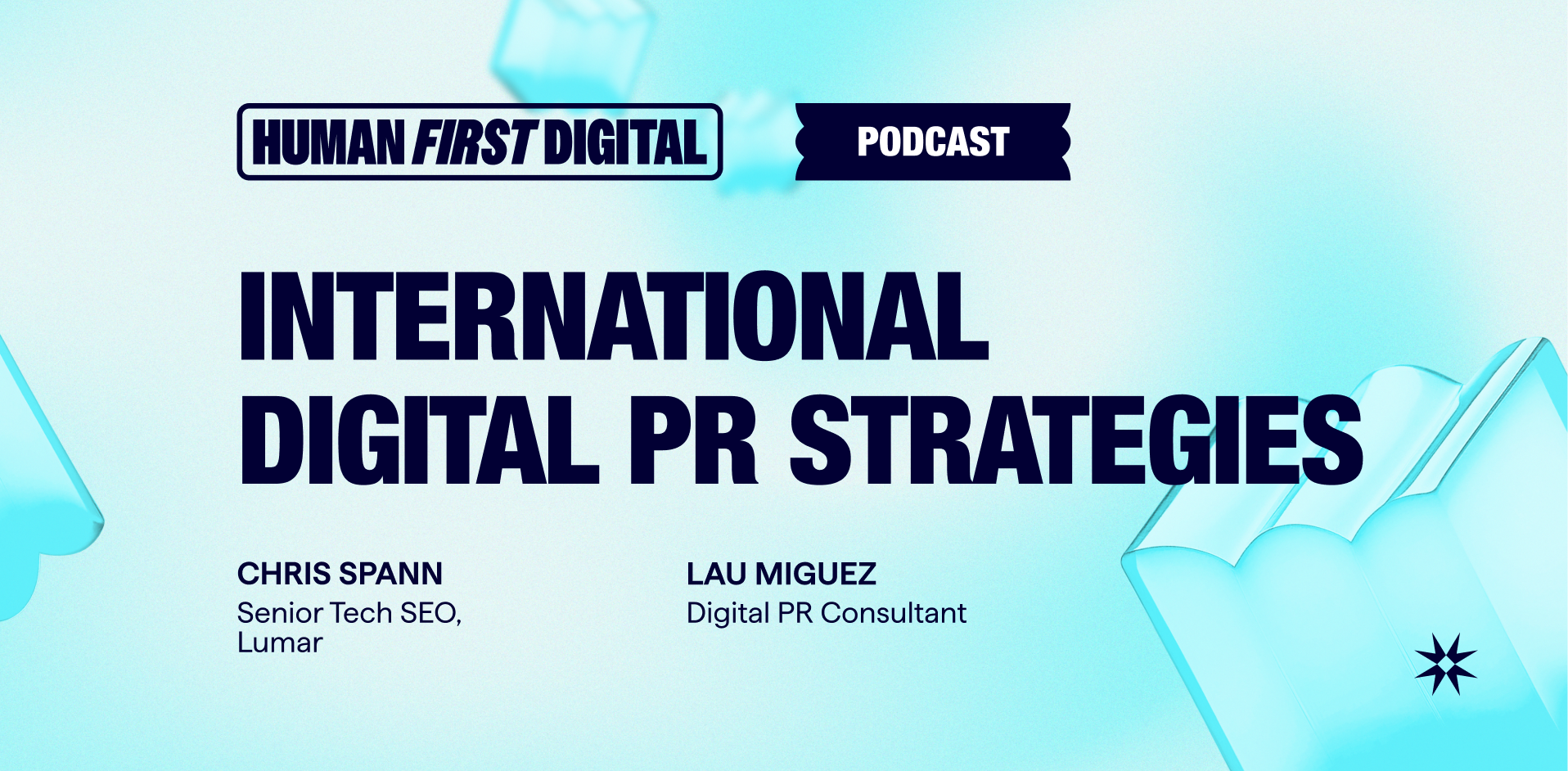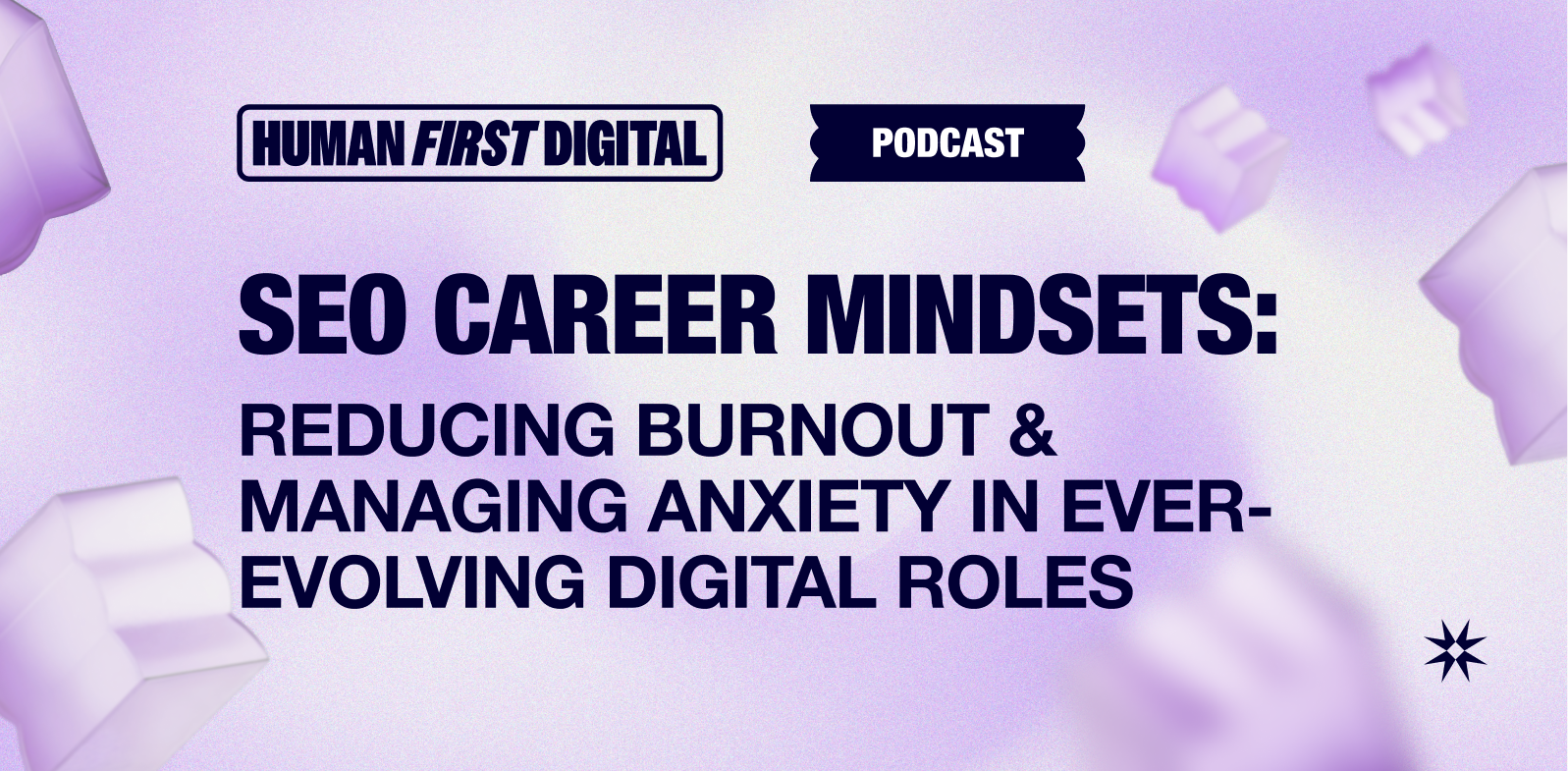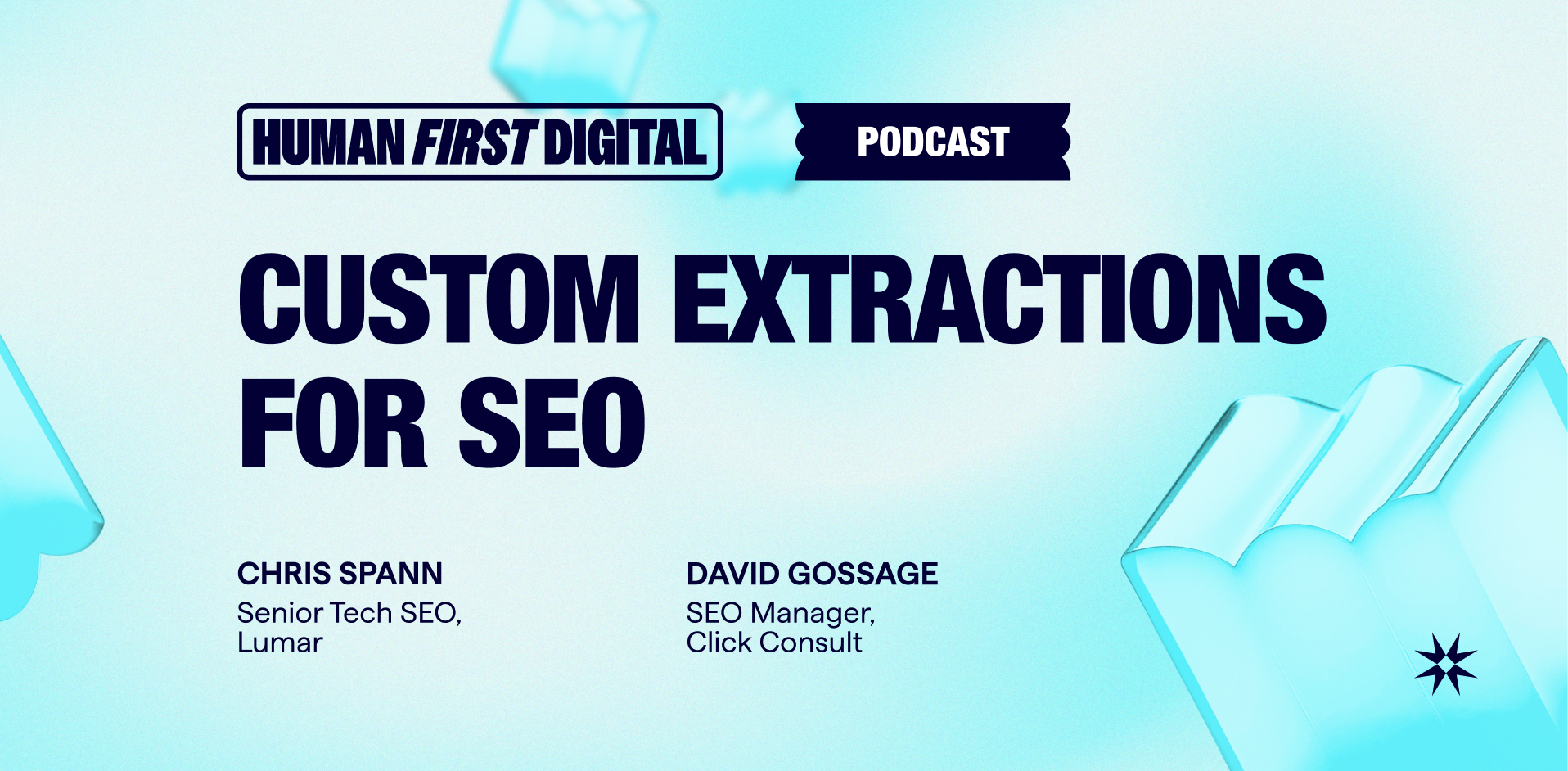Lumar’s SEO & digital marketing interview series continues this week with a conversation between Senior Technical SEO, Jamie Indigo, of Lumar’s professional services team, and Grace Frohlich, SEO Consultant at Brainlabs Digital (and a recent first-time speaker at last month’s BrightonSEO conference).
The two speak about SEO maturity audits, holistic search concepts, and how to switch careers from digital marketing to SEO.
Listen to their full interview below, or read on for an abridged transcript.
Jamie: This is our second day of BrightonSEO, and with me, I’ve got Grace Frolich. Welcome!
Grace: Thank you very much.
Jamie: So what did you speak about [at BrightonSEO]? What was the title of your panel?
Grace: I talked about the ultimate SEO maturity audit.
Jamie: Whoa. “The ultimate.”
Grace: I mean, “ultimate” is subjective, I guess, but I think it’s pretty good!
Jamie: Tell me all about it, I’d love to hear. What does SEO maturity mean?
Grace: It’s basically gauging the maturity of a website in its industry. So in the audit, it’s a seven-step process. Each step has its own checklist and criteria, and it’s given a score from 1 to 5 (five being the highest). And then I took everyone through the audit, what to check for, what to look for, and at the end, what the outputs are.
Jamie: Yeah. And what does the output allow someone to take action on?
Grace: So there are three main outputs that I talked about. The first output really is quick wins. Understanding where the opportunities are. And you’d have a prioritized list of actions, next steps. And then, ultimately, it helps you set an SEO strategy and a roadmap.
Jamie: So this is something foundational as you’re onboarding a new client, building that relationship.
Grace: Exactly. It’s very useful for new clients, onboarding, getting familiar with websites that you’re not that familiar with — things like that.
Jamie: I like that because we can’t fix what we can’t see. It’s a bit like buying a house, you’ve got to get the surveyor in to truly understand the land that it’s on it, the inspectors to see how the roof is working, all of those pieces.
Grace: I’m no expert in house building, but yes, that sounds like what it is.
Jamie: I think it’s reasonable. You have a prioritized list of items that you’re working on after this inspection that’s very much going, “Okay, so we should fix the hole in the roof. That’s key.” Or maybe it’s something very simple, we have a site that has (in a perfect world) SEO really built into its ecosystem and it’s handling the creation, retirement, and information architecture of new pages. (That’s rarely ever the case, but can at least provide a solid starting point and context to build every deliverable.)
Grace: Exactly.
Jamie: Was this your first time at Brighton?
Grace: Yes.
Jamie: As an attendee?
Grace: Just ever.
Jamie: So you really doubled down. You’re like, “It’s gonna be my first time in Brighton and it’s been my first time public speaking.” I am here for it. What inspired you to take this jump?
Grace: To be honest, when I got into SEO, one of my goals was to do public speaking. I think I was really inspired by current speakers, more seasoned speakers, in SEO. I watched some of their talks online and I thought, “You know, I really would love to do that.”
Jamie: What have you learned through this experience?
Grace: Oh, gosh. I mean, what haven’t I learned? I think the main thing I learned was how far I can push myself, really. It’s all about believing in yourself, that you can do it. And I did.
Jamie: So what got you into SEO?
Grace: That is actually another story.
Jamie: I am here for the stories. Literally, I brought the mic.
Grace: SEO is my second career.
Jamie: Really? What did you start at?
Grace: I used to work in fashion marketing in New York. So it’s very different. It was more product-focused, traditional marketing. At the time, I didn’t even know what SEO was. I didn’t know it was a thing.
Jamie: So many people ask Google a question and they assume it just has the answers without realizing there’s a whole industry of people whose professions it is to manipulate those results. So what got you from fashion to here?
Grace: After ten years, I kind of felt stuck. It was a fairly toxic environment, to be honest.
Jamie: Devil Wears Prada, was it like that?
Grace: I mean, that’s not my personal experience, but I have heard stories that are similar to that. And it’s very difficult to move up or take your career where you want to in fashion. Very difficult.
Jamie: So did you find yourself in one of those difficult-to-level-up places and decide to make the shift?
Grace: Yes, it was a combination of that and not wanting to be in an environment that didn’t support me.
Jamie: Absolutely. And SEO is one of the most supportive industries. There’s so much community to it.
Grace: That’s what I’ve found and I’m so grateful for that. So I guess after ten years [in fashion], I quit my job. I’m lucky enough and privileged enough to do that and take a break and figure out what I wanted.
Jamie: Take that step back, reassess the landscape, do your own maturity audit for a career. And go, “We have the resources and the capabilities to go ahead and make this switch.”
Grace: Yes, exactly. I applied for so many entry-level jobs in digital marketing, for a good six months. I applied for internships. And then, one day, someone got back to me. I got an internship in New York, and it was for three months.
Jamie: That’s not a small feat, that’s a very competitive thing to do.
Grace: I was surprised but also really happy that I actually got something. At the time it was Amsive, or Path Interactive at the time.
Jamie: Ah, with Lily Ray?
Grace: Yeah, with Lily. So I worked in her group as an intern for three months. It was honestly one of the best internship experiences I’ve ever had. I had three, four, five internships before that.
Jamie: And this one puts you in a place after three months to go from an intern to a full-time position. You’re now with Brainlabs.
Grace: Yes, I am.
Jamie: What do you do for Brainlabs?
Grace: I’m an SEO consultant.
Jamie: Wonderful. So you work with the clients, then?
Grace: Yes. Client facing. I lead accounts. I’m also second on other accounts, working with my colleagues.
Jamie: So a good support network internally as well.
Grace: Exactly. We’re all about internal support, making sure everyone’s growing together, which, you know, I love that environment.
Jamie: That sounds like a beautiful environment. The chance to level up pretty persistently, and the support to say, “Hey, I want to go to Brighton and I want to speak for the first time.” And have that backing. I love that.
In your work with clients, what do you see being the three biggest challenges, or repeating patterns coming up? It can be with the client relationships, it can be within their sites, or in the industry as a whole.
Grace: One thing that comes to mind is getting to the point with the client where they trust you. It’s a huge learning curve. When I had my first client, it was not just about building the relationship. It’s really about figuring out what’s going to help the client the most, Because they won’t always tell you. You kind of have to dig a little bit.
Jamie: And sometimes their expectations don’t match reality.
Grace: Yeah, exactly. And sometimes it’s knowing what questions to ask because sometimes a client will want or will expect something. You know, you interpret that, you think, “Okay, this is what they want.” But actually, they needed something else. I know it’s very abstract.
Jamie: What we want isn’t always what we need.
Grace: That’s, I think, the most challenging thing that I’ve found.
Jamie: What has been your favorite Brighton moment so far?
Grace: Of course I love watching the talks, especially talks that are very practical, I guess, or speak to what our problems are, what we deal with on a daily basis. It’s something that’s relatable for us.
That’s what I really love about going to conferences. Maybe you’re struggling with a problem, and you talk to colleagues — you’re like, “I’m not sure what to do here.” And it’s great to talk to your colleagues. They have different experiences, but it’s also good to reach out to…
Jamie: …the community! There are so many specialties and niches [in SEO], and there are some folks [you can ask,] “Hey, who knows how to handle when it has platform detection on for React” There are just highly niche questions that only a handful of people can answer. But knowing who those people are is such a benefit.
Grace: It really is.
Jamie: Any speakers that you were just blown away by?
Grace: I mean, I personally really admire specific people. Of course, I love Areej [from Women in Tech SEO].
Jamie: Who doesn’t love Areej?
Grace: I also loved Crystal Carter’s talk a lot.
Jamie: Crystal Carter from Wix has just been blowing it out of the water.
Grace: She really has. But a few others as well. Of course, I have to shout out my colleague at Brainlabs, Arpan’s talk. She was also great.
Jamie: What did Arpan speak on?
Grace: She spoke on holistic search. That’s something we’re working toward pushing our clients to go for at Brainlabs.
Jamie: For those not familiar, help us understand holistic search.
Grace: So holistic search is basically one [view of] search — prioritizing organic, but it’s also about working together with paid search, alongside organic, to dominate the SERP.
Jamie: I mean, page one is mostly ads, so.
Grace: Exactly. I’m really excited about that. Potentially working with clients to use that, use maturity audits. These are things that I personally would not have been able to accomplish without a group mindset, collaboration.
Jamie: I think collaboration is key. It’s really how we can survive in SEO. There are so many niches and specialties and pipelines out there.
So for those who might be attending an SEO conference for the first time, or even stepping up to [speak], butterflies in the stomach, the feeling of pitching, what advice would you give them?
Grace: I mean, I touched on this before. It’s really about believing that you can do it, believing in yourself. But it’s also about… Personally, I practiced so much that it was kind of second nature, almost, when I finally got on stage. I kind of surprised myself. It just flowed out, and it was fine. But I would definitely say, use your community, use your support network, and practice in front of your colleagues, your friends.
Jamie: The people who are going to be there in the front row excited to watch you.
Thank you so much for joining me today, Grace. For folks who may want to reach out to you or follow you on social media, how can they get in touch?
Grace: Oh, I’m on LinkedIn. That’s probably the best way. I don’t really do Twitter!
Jamie: That’s fair. We can’t have everyone join the cult of SEO on Twitter. Thank you so much for joining me today. I hope you have a fantastic day two and let’s stay in touch.
Grace: Thank you very much.
This article is part of Lumar’s SEO & Digital Marketing Interview Series.
Jamie Indigo is part of Lumar’s professional services team.





